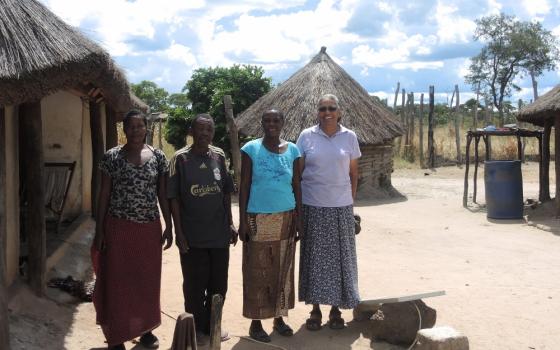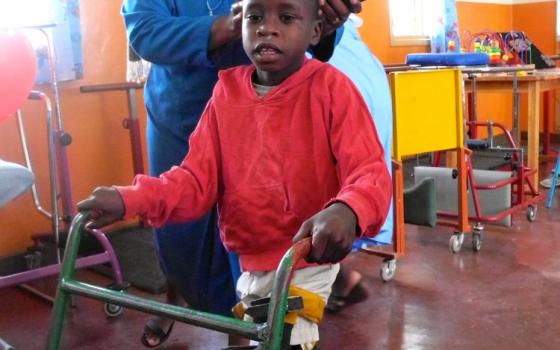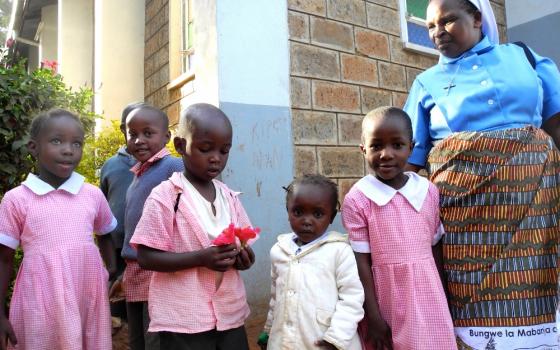Since launching the Global Sisters Report Africa:Connect discussion group last month on the WhatsApp platform, we've reached almost 40 sisters in six countries. Every week, we discuss an article from Global Sisters Report or a question. Ahead of Pope Francis' first trip to Africa Nov. 25-30, I asked the sisters to share their hopes and dreams for the visit. Here's the conversation that followed, edited for style and clarity. Participants were asked permission for Global Sisters Report to share this private discussion on the website.
Melanie Lidman, reporter, Global Sisters Report, Israel: What are you hoping the pope's visit to Africa will accomplish? What do you want Pope Francis to learn about the church in Africa and the unique challenges and successes of ministering in this part of the world? Tell us your thoughts!
Sr. Lynette Rodrigues, Presentation Sister, Zambia: I hope the pope's visit will help us to see the realities of our societies and environment across the African continent. We should examine the way we're facing life and the reality of so many people excluded from receiving Eucharist because of their marital situations. I want Pope Francis to see the African church's approach to evangelization as justice and peace, enculturation, dialogue, proclamation, and reconciliation like they did during the African synod. We also hope that the church in Africa will look at the issues of migration to other continents and not to ignore ecological crises. It's important to talk about the issues of desertification, deforestation, water, and sanitation and how we could take responsibility to care for the Earth. So before Pope Francis comes to our continent of Africa, I hope we will read the encyclical Laudato Si' and see what challenges are put to us as a church.
Sr. Clementina Obembe, Franciscan Sisters of the Immaculate Conception, Nigeria: In addition to that, when the pope visits Africa, it will be nice to look at the security issues, especially with al-Shabaab and Boko Haram killing innocent people day in and day out. Our leaders are playing politics with this, but we need serious prayers to combat this in Africa.
Rodrigues of Zambia: We could also look at our prophetic role as women religious in Africa and how we can speak and act to make a difference in Africa, besides saying prayers, by being true disciples of Jesus Christ. Look at what the pope meant by "wake up the world" in this year of consecrated life. Are we ourselves awake? Are we aware of what is happening in the world, in our times? What response are we making? Where is the church called to renew?
I also hope Pope Francis will engage us in the issues that came at the synod on family life and how it impacts the families in Africa.
Sr. Placida McCann, Franciscan Sisters of the Immaculate Conception, Kenya: I pray that Pope Francis will address the issue of corruption both inside and outside our church.
Sr. Agnes Wamuyu Ngure, Elizabethan Sister, Kenya: The presence of Pope Francis will kindle new enthusiasm to live the Christian faith in a renewed way. The joy he brings with him will be infectious. Many will return to God.
Sr. Ann Nayieso, Little Sisters of St. Joseph, Kenya: As a Christian, I am anticipating the pope's visit to Kenya. But I also ask myself, will his visit make a difference? If I had an opportunity to ask him a question, I would tell him: Responding to the needs of the poor is not a favor to them, but a command to care. Nuns and sisters are also among the poor, but how are we going to help the poor among us before reaching to those outside there? Poverty among sisters has led to diversions of attention and thus, little impact.
Sr. Jane Wakahiu, Little Sisters of St. Francis, Kenya and the United States: The pope took the name Francis, a reminder of Francis of Assisi's call of the mighty and powerful of his country at the time. The original Francis' call was to be mindful of the poor, a call to repentance and to rebuild the church, the body of Christ, at a time when lepers (poor) were ignored, and the rich made every effort to get richer. The pope's presence will be a moment for Africa to ask, how are we doing? Where have we gone wrong? What do we need to do to sustain the vibrancy of faith and hope for our people? And how are we caring for our poor, elderly, marginalized? I think the pope will pose these questions, calling Africans to go deeper. Africa will be saved by Africans — returning to authentic African values.
Sr. Beatrice Were, Assumption Sisters of Eldoret, Kenya: The pope's visit to Africa will not bring change unless we ourselves [change]. Religious men and women and even the laity must change the way we perceive things.
Nayeiso of Kenya: Sisters, those of you who were there during the visits of Pope John Paul II in Kenya [in 1985] and managed to hear his speech, what changes happened? What difference or value did it add to the people? This may provoke a preview of what we can expect from Pope Francis' visit to Kenya.
Sr. Cherotich Chuma, Sisters of St. Joseph of Peace, Kenya and the United States: The pope will remind and encourage us to go back to living the Gospel truthfully, preferably increasing our encounters the poor. It is my hope that his message will touch the hearts of the leaders or bring change in their hearts so that they can lead and bring peace and justice to the people. It is my hope that he will touch on the societal sin (corruption) and safety/security issues, which are causing migration all over the continent. Also, personally — but this might be being too hopeful — I pray and hope that some leaders will step down from office the John Boehner way. John Boehner (USA House of Representatives) was touched by the Holy Spirit and the pope's visit and address to a point that he resigned last month. So hopeful!
Sr. Mercy Kariuki, Immanuel Sisters, Kenya: For me, I believe we should go back to our roots as the consecrated women, to the spirit of our different founders. This is what the Holy Father speaks about and it's our wake-up call, that we must live what we have vowed.
Wakahiu of Kenya and the United States: I hope for the possibility that the pope will also address Africa in light of the 17 U.N. sustainable goals. I hope he'll discuss what is the role of government, church and religious women in attaining these goals for Africa. All 17 goals touch on the work sisters do, except maybe two. The first goal is "no poverty." So what is the role of sisters in ending poverty? In light of the Year of Mercy, how does mercy relate to serving underserved populations?
Kariuki of Kenya: The Year of Mercy is Pope Francis challenging us to be present. Are we here for those are in need, or are we too busy with our own things? Our presence must be with the people by raising their hearts. Today's Gospel speaks to us and reminds us to be a good neighbor. If you are sick, I will visit you.
Rodrigues of Zambia: I agree. I also hope that Pope Francis will link with the 17 sustainable development goals and relate that to Laudato Si'. Our culture is too much disposable. . . . We in the African continent are having a destructive impact. We must convert to integral ecology, taking care of the sacred web of life. This is our common home, and it is our only home.
Ngure of Kenya: I suppose the pope will speak about the family and underline the results of the synod of the family. I hope he will discuss with the president about the growing gap between the rich and the poor. He must acknowledge the fact that Kenya is a youthful country and underline the need for pastoral care and education. I also hope he will speak of interreligious and intercultural dialogue.
Sr Jane Wanjiru, Missionary Congregation of the Evangelizing Sisters of Mary, Kenya: I am excited to see the pope, to hear and possibly to touch him. I think the main aim is to deliver the message of PEACE to Africa as he has done to other continents. As a missionary, the pope must visit his sheep because he will reach many people. That is the best way for him to discover what are our successes, challenges, recommendations and way forward, rather than him sitting and waiting in Rome for the report to reach his desk. He is accomplishing his duty as a shepherd.
Are you a sister in Africa? Email Melanie at [email protected] to join our WhatsApp discussion group.
[Melanie Lidman is the Middle East and Africa correspondent for Global Sisters Report.]







